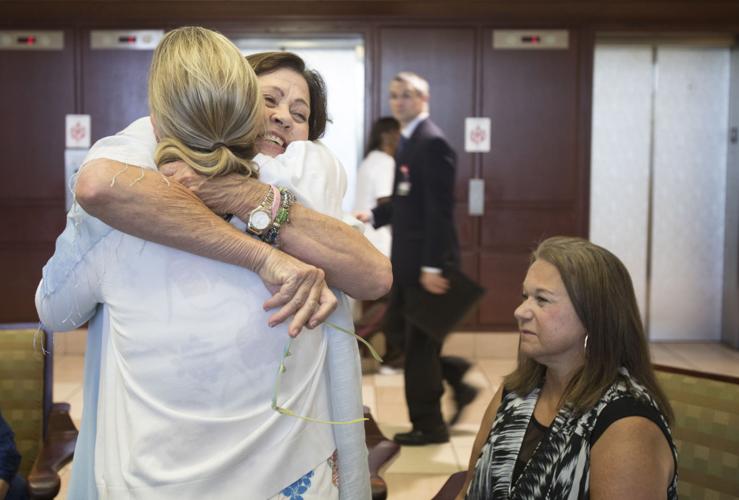After 10 years of waiting for a clinical trial's results, Camille Hilton found out she got treatment for her breast cancer she might never have needed.
There is no added benefit of chemotherapy for 70 percent of women with the most common type of breast cancer, like the kind Hilton had, the study showed.
Hilton was a research participant recruited 10 years ago after her oncologist at Roper St. Francis told her about the trial. But she wasn't upset by the news — quite the opposite.
"I'm delighted," Hilton said. "Whatever the results were, it was going to help women."
The treatment assigned was partly random and partly a factor of the kind of cancer they had, what stage and their age. Results were published June 3 in the New England Journal of Medicine. Researchers sought to understand whether doing chemotherapy produced better results than hormone therapy alone.
"We have been waiting for years for the results of this study, and here we have it," said Dr. Steven Akman, medical director of Roper St. Francis Cancer Care.
Roper St. Francis was one of the study's research sites. There was a celebration Tuesday honoring three of the women who enrolled in the study. Researchers followed women for 10 years to track how subjects fared — breast cancer tends to "hide out" in the body for a long time, Akman said.
The new thinking takes some of the guesswork out of deciding between chemotherapy and hormone therapy. It potentially affects many thousands of patients: 266,120 new breast cancer cases are expected to be diagnosed in 2018, according to the National Cancer Institute.
Akman said it will help doctors advise their patients. Oncologists can now rely upon the specific recommendations.
A test of a patient’s tumor tissue can score their breast cancer, Akman said. Prior to the study's results, a lower score already suggested chemotherapy wasn't needed. A high score indicated a more aggressive treatment might be called for.
Akman explained it was patients in the middling range whose best line of treatment was unclear.
He also said he considers the study participants to be brave, because some may have gotten the more toxic treatment without needing it.
The opposite was true for Sara Sechrist: She received no chemotherapy. With her score and the size of her tumor, she said she may have otherwise been faced with a difficult choice.
"Women now don't have to make the decisions we had to," she said.
Sechrist also encouraged women to do their yearly mammogram. The new thinking can only be applied to women whose cancer is identified early in the disease's progression.
The trial's results could have huge financial meaning for new breast cancer patients, too.
The cost of having breast cancer in 2016 was pegged at about $82,000 for a stage 1 or 2 diagnosis, according to research based on thousands of patients' information published in the journal American Health & Drug Benefits. Chemotherapy accounted for about $14,000 of those costs.
Hormone therapy is generally cheaper.
Today, each of the three trial participants is cancer-free.
Editor's note: The story has been updated to more accurately describe how a patient's breast cancer is scored to determine if chemotherapy is necessary.









